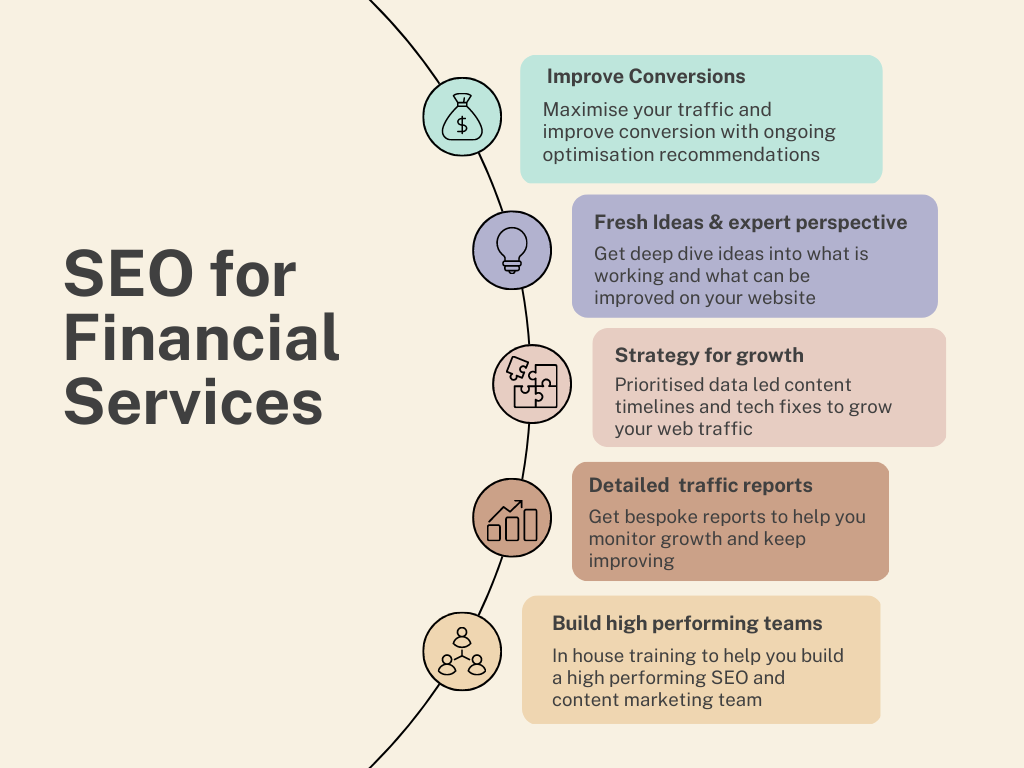In the ever-evolving world of the internet, having a strong online presence has become crucial for businesses, particularly in the financial services industry. If you want to get noticed and increase your website’s visibility, search engine optimization (SEO) is the key. By optimizing your website and tailoring your content specifically for financial services, you can improve your website ranking on popular search engines like Google. In this article, we will explore how SEO strategies can help elevate your online presence and attract more potential clients to your financial services. So, let’s dive into the world of SEO and discover the secrets to achieving higher rankings!
Understanding SEO for Financial Services
In the digital age, having a strong online presence is crucial for financial services companies. One of the most effective ways to improve visibility and attract potential clients is through search engine optimization (SEO). SEO plays a vital role in improving website rankings on search engines like Google, Yahoo, and Bing. By implementing effective SEO strategies, financial services providers can increase organic traffic to their websites and ultimately generate more leads and conversions.

The Importance of SEO for Financial Services
The financial services industry is highly competitive, with numerous companies vying for the attention of potential clients. With so many choices available, it’s essential to stand out from the crowd and be easily found online. This is where SEO comes into play. By optimizing your website and its content for search engines, you can ensure that your financial services firm ranks higher in search results, making it more visible to users searching for relevant keywords. This increased visibility can lead to higher website traffic and more opportunities to convert visitors into customers.

How Search Engine Optimization Works for Financial Websites
Search engine optimization involves various techniques and strategies that aim to improve a website’s visibility and ranking in search engine results pages (SERPs). The ultimate goal is to establish your financial services website as a credible and authoritative source of information for both search engines and users. SEO considers factors such as keywords, on-page optimization, technical aspects, link building, user experience, and mobile optimization. By addressing these areas effectively, you can enhance your website’s visibility and attract more targeted traffic from organic search results.

Key Elements of Successful SEO Strategies for Financial Services
To develop a successful SEO strategy for your financial services website, it’s crucial to focus on the following key elements:
Keyword Research
Effective keyword research is the foundation of any SEO strategy. By identifying the keywords and phrases that your target audience is using to search for financial services, you can tailor your website’s content to match their intent and preferences. A range of tools, such as Google Keyword Planner and SEMrush, can help you uncover relevant and high-performing keywords.
On-Page Optimization
On-page optimization refers to optimizing various elements within your website to improve its search engine visibility. This includes optimizing webpage content and meta tags, using keyword-rich titles and headings, creating unique and valuable financial content, optimizing URLs, alt tags, and internal linking, as well as ensuring mobile-friendliness and fast page loading speed.
Technical SEO
Technical SEO focuses on optimizing aspects of your website’s technical infrastructure to improve crawlability, indexing, and overall performance. This includes improving website crawlability and indexing, ensuring proper site structure and XML sitemap, implementing schema markup specific to financial services, optimizing website speed and performance, and understanding and resolving technical SEO issues.
Link Building
Link building plays a crucial role in improving your website’s SEO. By earning high-quality backlinks from authoritative financial websites, you can enhance your website’s credibility and authority in the eyes of search engines. Effective link building techniques include content marketing and outreach, building relationships with authoritative financial websites, and guest blogging and thought leadership to acquire valuable backlinks.
Local SEO for Financial Services
For financial services providers targeting a specific location or region, local SEO is essential. By targeting location-based keywords for localized search, optimizing your Google My Business listing, cultivating positive online reviews and ratings, and leveraging local directories and citations, you can increase your visibility within your target market and attract clients seeking financial services in your area.
Content Marketing for Financial Websites
Content marketing involves creating valuable and informative content that resonates with your target audience. By developing a content marketing strategy for financial services, you can provide valuable insights to your clients and establish yourself as a thought leader in your industry. Promoting your content through social media and email marketing, as well as utilizing engaging formats like videos, infographics, and multimedia, can further enhance your online visibility and attract potential clients.
User Experience and Conversion Optimization
Improving website user experience is crucial for better SEO performance. By optimizing website navigation and structure, enhancing website design and readability, implementing effective call-to-actions for lead generation, and tracking and analyzing user behavior, you can create a seamless user experience that encourages visitors to explore your website further and take desired actions.
Mobile SEO for Financial Services
With the increasing use of mobile devices for online searches, mobile optimization is critical for financial services websites. By adopting responsive design and ensuring mobile-friendly websites, optimizing mobile page speed and load times, and utilizing features like Accelerated Mobile Pages (AMP), you can improve your website’s ranking on mobile search results and provide a positive user experience to mobile users.
Monitoring, Analysis, and SEO Reporting
Monitoring your website’s rankings and organic search traffic is essential for understanding the effectiveness of your SEO efforts. Utilizing tools and analytics to monitor SEO performance, analyzing website data and user behavior, and generating comprehensive SEO reports provide valuable insights and allow you to make data-driven decisions to further optimize your financial services website.
In conclusion, understanding SEO and implementing effective strategies is vital for financial services providers to improve their online visibility and attract potential clients. By focusing on keyword research, on-page optimization, technical SEO, link building, local SEO, content marketing, user experience, mobile optimization, and monitoring and analysis, financial services firms can enhance their website rankings, generate more organic traffic, and ultimately grow their business in the digital realm.


